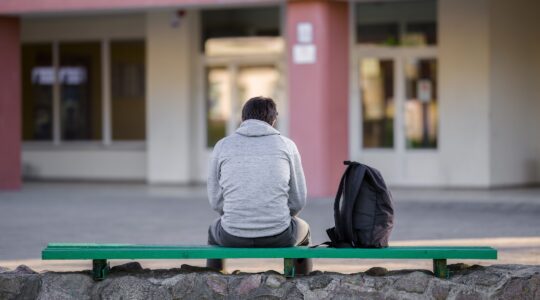This time, in the pitched battle between Rabbi Avi Weiss and the Orthodox establishment, the “rabba” was merely the undercard.
Sara Hurwitz is a spiritual leader at the Hebrew Institute of Riverdale, and her promotion in March to rabba, a member of the shul’s rabbinic leadership, by Rabbi Weiss set off a brushfire of criticism at HIR and across the Orthodox world. She was at shul as usual last Friday night, but she was hardly the main event.
In Rabbi Weiss’ latest effort to push the boundaries of women’s roles in an Orthodox shul, he had a woman, Lamelle Ryman, lead a Friday-night service with both men and women in the pews. Rabba Hurwitz, who heads a seminary for Orthodox women created by Rabbi Weiss, made a few brief remarks, not even touching on the fact that no other Orthodox synagogue in the U.S. had apparently ever before had a woman lead a Kabbalat Shabbat service.
But it was Ryman’s show, and according to those in attendance, the davening was beautiful. Still, the alternative minyan that played out last weekend in the synagogue’s upstairs Beit Midrash study hall — the service drew about 50 people, roughly 20 men and 30 women separated by a mechitza divider — has caused additional anguish at the Hebrew Institute, in what has been the spring and summer of its discontent.
Like most members of the prominent Modern Orthodox congregation, Bernice Schwartz only learned that HIR would add a Friday night service led by a woman when she received an unsigned e-mail from the synagogue that Friday morning.
She was upset, not that a female would lead a worship service at the synagogue, a sharp departure from traditional Orthodox practice, but that HIR members found out at the last minute.
“The Hebrew Institute does things impulsively, then looks for [justifying] answers,” Schwartz said. She was referring not only to the short notice about the woman-led service but also that Rabbi Weiss’ conferring of the rabba title came with little or no prior discussion within the synagogue.
“It is given over as fait accompli; there is no input,” Schwartz continued. “There is no [consultative] process. It would be helpful if we could sit down while these ideas were germinating.”
Her frustrations over the rabbi’s authoritarian leadership style, as well as his radical innovations that risk the shul’s Orthodox standing, were echoed by several other congregants who preferred to remain anonymous because they, for now, are still members of the shul and felt uneasy confronting the rabbi.
According to a recent New York Magazine story, Rabbi Weiss’ “close congregants describe — with affection and exasperation — a man who claims to invite opinions but ultimately listens to his own.”
The rabba controversy seemingly reached closure when Rabbi Weiss — under strong pressure from the Rabbinical Council of America (RCA), centrist Orthodoxy’s largest rabbinic body — vowed that he would no longer confer the rabba title. He also apologized to the congregation for his handling of that situation. However, last week’s move added kindling to the fire just as some thought it was over.
The RCA has called Rabbi Weiss’ latest innovation “a violation of Jewish tradition.” A censure may yet follow.
To be sure, the move had its supporters. “I thought it was wonderful — it’s welcome,” said Jonathan Schorsch, an HIR member who led the Maariv evening service after Kabbalat Shabbat.
Ryman “did a wonderful job,” Schorsch said. “I had no sense of any problem” among the worshippers that night. They were a “self-selected crowd.” In the following days, he said, he heard “only positive reactions.”
The congregation was said to have taken a hit in attendance, and even in membership, over the rabba issue and how it was handled by Rabbi Weiss, and more congregants may be lost because of the female-led Kabbalat Shabbat, some members say.
But Howard Jonas, a former president of the congregation and once one of its leading financial supporters, said HIR is unlikely to lose more members.
“There are a lot of people who stopped going” to the Hebrew Institute in protest over the rabba controversy, he said. “All the people who … didn’t agree” with having a rabba have already departed. “There’s nobody left to object.”
Jonas says he frequently meets former members of HIR when he attends services at other Orthodox congregations in Riverdale.
At the same time, he said, “I know there are large numbers of people who have stayed in the shul” because of the rabbi’s innovations. “There may be additional people who join because of it.”
Jonas said, “I view Rabbi Weiss as a tzaddik — I have tremendous gratitude to him for being a spiritual mentor to me and my entire family.” Nevertheless, “I don’t agree with women rabbis. I am not comfortable with it. It’s just a slippery slope” toward other liberalizations taking the shul beyond what is generally recognized as Orthodox.
Jonas said he is still a member of HIR, but declined to say if he has decreased his contributions to the synagogue this year.
“You can say I’m a supporter of the yeshiva,” Chovevei Torah, which also was founded by Rabbi Weiss, Jonas said. In contrast to his changes in the synagogue, Rabbi Weiss has yet to make similar feminist innovations at Chovevei Torah, which does not admit women.
The synagogue’s unsigned e-mail notice — “Additional Kabbalat Shabbat: What and Why” — last Friday offered explanations, from a halachic perspective, why a woman leading a prayer service is permissible: “A number of halakhic sources point out that … kol ishah [the prohibition against a man hearing a woman sing, particularly in public] is not a concern where women are chanting in a liturgical context.”
Rabbi Weiss and Rabba Hurwitz did not respond to requests for interview. Rabbi Exler, who did not want to be interviewed, said in a statement representing his colleagues, “While the Main Sanctuary hosts our central tefillah, we do have other tefillot that reach the varying segments of our community at different times and other locations in our Bayit. It accords with our vision of making room for many voices within Orthodoxy and the bounds of halakhah.”
Representatives of the Orthodox community disagreed over the propriety of HIR’s alternative service.
“It’s a good thing. I’m very much in favor of it,” said Rabbi Dovid Silber, dean of the Drisha Institute for Jewish Education, which calls itself “the foremost center for the advanced study of Jewish classical texts by women.”
A female-led Kabbalat Shabbat opens up Jewish worship to more people, Rabbi Silber said. “It’s an opportunity to get more people more involved in prayer.
“It’s not that unusual,” Rabbi Silber said, adding that Orthodox institutions like the Darkhei Noam prayer group in New York and the Shira Hadasha congregation in Jerusalem already have had women leading Kabbalat Shabbat, said Rabbi Silber. “There’s no halachic problem, whatsoever. It’s a matter of what a community is used to.”
In addition, there was a female-led Kabbalat Shabbat in a Washington Heights apartment in Manhattan — most of the worshippers came from the Yeshiva University community — in 1987 that drew little attention or opposition, according to a post that appeared this week on the kavvanah.wordpress.com blog.
“The group chose to have a woman lead Kabbalat Shabbat in a non-shul setting,” the post stated.
Rabbi Avi Shafran, a spokesman for Agudath Israel of America, an umbrella haredi organization, said Rabbi Weiss’ move “saddens me.”
Although some interpreters of Jewish law have ruled that Kabbalat Shabbat, a 16th-century addition to the davening, is not subject to the same limitations of who can lead other prayer services, it has traditionally been led by men.
“What defines Orthodoxy is — as it always has been — fealty to the Jewish religious tradition. What is Jewishly right and Jewishly wrong, from an Orthodox perspective, is not always divined from a halachic text. And it is certainly not divined from a congregational rabbi’s personal feelings, especially feelings born of what broader society considers proper,” Rabbi Shafran said.
“When an Orthodox Jew who truly respects our mesorah [tradition] wants to do something that has no Jewish precedent, he seeks the guidance of elder decisors, those who not only know the sources well but who possess deep experience and sensitivity to the mesorah,” Rabbi Shafran continued. “That doesn’t seem to have happened here, and that is what so saddens me. Innovations … in Jewish ritual may only be made with the guidance of a posek [halachic expert] — and for an innovation like this, a posek universally recognized and respected.”
Rabbi Shmuel Goldin of Englewood, N.J., a vice president of the Rabbinical Council of America, said RCA leadership is critical of Rabbi Weiss’ action, but has not yet decided on any action it may take.
“A woman serving as shaliachat tzibbur [the cantor] for any portion of synagogue services is unacceptable,” Rabbi Goldin said. “If such a thing occurred, it would obviously be wrong and not in keeping with Orthodox tradition.”
The recent RCA agreement with Rabbi Weiss, in which he agreed not to ordain women, did not foresee and “did not address” a woman leading services, Rabbi Goldin said, so Rabbi Weiss’ action is not in technical violation of the agreement. “The question is, is it a violation of Jewish tradition, and we believe it is.”
Does Rabbi Weiss face disciplining by, or suspension from, the RCA?
“It is premature for us to comment on any particular action that we will be taking,” Rabbi Goldin said, “but all actions are on the table.”
E-mail: steve@jewishweek.org
The New York Jewish Week brings you the stories behind the headlines, keeping you connected to Jewish life in New York. Help sustain the reporting you trust by donating today.




